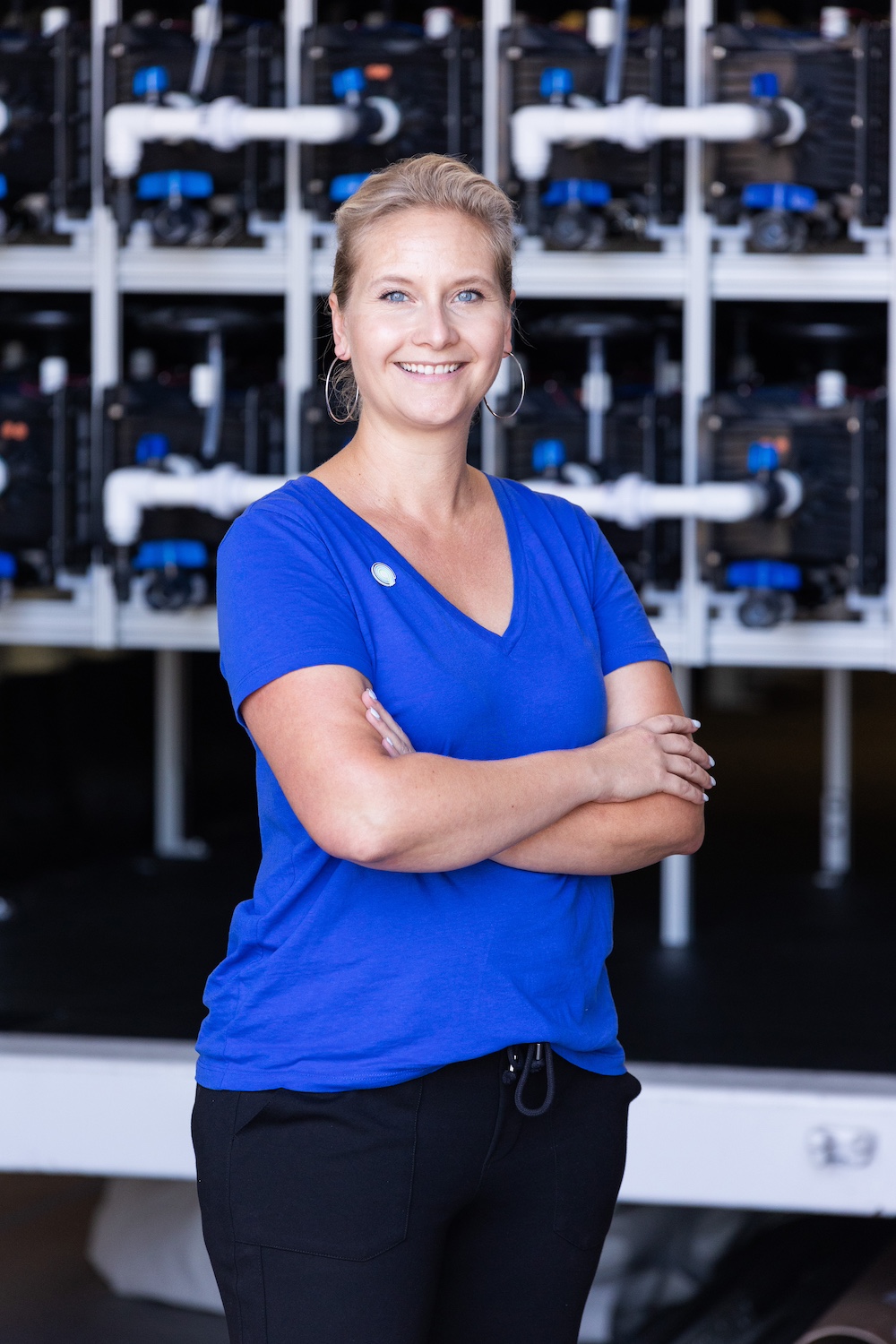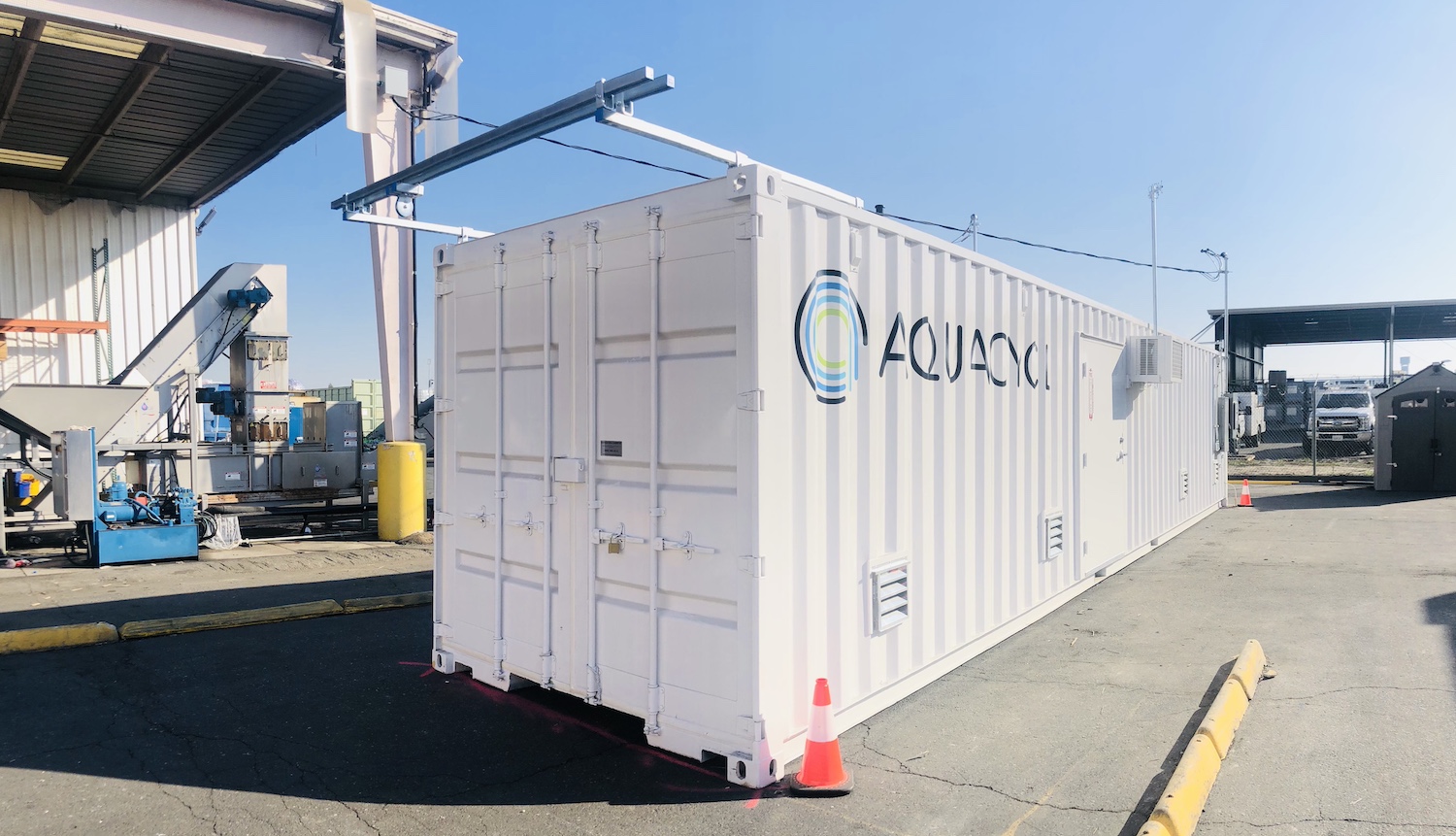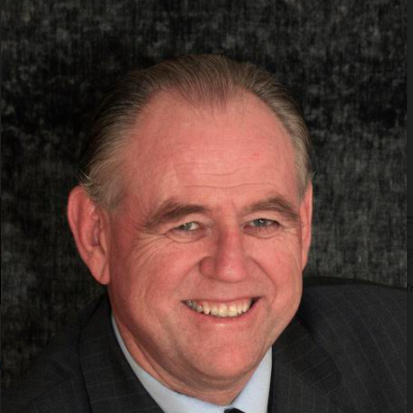
Orianna Bretschger (right), Aquacycl co-founder and CEO, and Sofia Babanova (left), co-founder and CTO, stand in front of the BioElectrochemical Treatment Technology wastewater treatment system stacked in a shipping container. (Image courtesy of Aquacycl.)
Despite improvements globally, 2 billion people in the world still lack access to drinking water services, and approximately 3.6 billion people — 46 percent of the world’s population — lack adequate sanitation, according to a United Nations World Water Development Report.
Orianna Bretschger can relate. Growing up with parents who moved around frequently, she lived in remote places like a ghost town outside of Fort Huachuca, Arizona, and off the grid at the base of the Cascade mountains in Oregon. Bretschger often lived without consistent access to running water or electricity, with gas lamps and fire for light and heat and an outhouse for sanitation.
From those experiences and a lot of science, she co-founded Aquacycl, a San Diego startup that provides sustainable and cost-effective industrial wastewater treatment services on-site using an innovative bacterial process. The process addresses industrial wastewater with a high biological oxygen demand (BOD). BOD is used as an index of the degree of organic pollution in water, according to the United States Geological Survey.
“The greater the BOD, the more rapidly oxygen is depleted in the stream [where the treated wastewater is ultimately discharged],” according to the U.S. Environmental Protection Agency. “This means less oxygen is available to higher forms of aquatic life.”

How the technology works
Aquacycl focuses on industrial discharge, which accounts for 30 percent of untreated global wastewater because it is the most challenging to treat. The firm addresses the wastewater problems of major brands operating large production facilities in smaller cities, where the municipalities’ existing facilities may find it difficult to deal with the discharge.
Aquacycl’s BioElectrochemical Treatment Technology relieves the local utility from processing industrial wastewater. This avoids the potential for discharge that has not been appropriately treated to end up in waterways where it could disrupt ecosystems. It also helps reduce infrastructure expenses and maintain fair pricing for all ratepayers in the municipality.
The system uses natural, locally-sourced bacteria to accelerate wastewater treatment rates, remove BOD, and eliminate and minimize sludge while simultaneously producing electricity.
The work starts in a little black box called a reactor. Each reactor is about the size of a standard car battery. Wastewater flows into the reactor, where the the locally-sourced microbes can consume the organics in the water. At the same time, the microbes are producing electrons as part of their natural metabolic and respiratory processes. Those electrons are captured by the reactor to generate power. The faster the electrons are removed, the faster the microbes eat.
The reactors are stacked together like building blocks inside a 40-foot shipping container. As the wastewater flows through each reactor, the microbes remove more organic carbon. Each shipping container can remove up to 3,000 pounds of BOD per day, according to Aquacycl.

The electrical current produced by the bacteria can power the treatment equipment. Each reactor, and all of the integrated sensors, are monitored and controlled remotely from Aquacycl’s headquarters. The process saves municipalities energy and produces 90 percent less greenhouse gas emissions than traditional treatment systems.
At a PepsiCo installation in Fresno, California, Aquacycl’s installation exceeded the required standards for BOD removal and for total suspended solids, which can reduce the efficiency of wastewater treatment plants, according to the the Environmental Protection Agency. Ben Duncan, PepsiCo’s Fresno manufacturing leader, told the Fresno Business Journal that the technology will be a game changer for companies in the future, and Aquacycl is at the forefront of the clean wastewater initiative.
Other client successes include removing hydrocarbons from tank terminal wastewater, treating discarded beverages for a major food and beverage company, and treating sugar-laden wastewater from a confectionery plant.
Where it all began
Aquacycl’s award-winning technology had its beginnings at the University of Southern California, where Bretschger was first introduced to the concept that bacteria can generate electricity and clean water at the same time.
That work took her to the J. Craig Venter Institute, a research organization focused on advancing the science of genomics, where she expanded her understanding of how communities of organisms communicate electronically. There, she and her team explored how to build a practical technology for wastewater treatment. With a $5 million grant from the Roddenberry Foundation, Bretschger and her team brought the technology to field trials to learn if it could scale.
The first pilot treated manure on a pig farm at a high school in Escondido, California, and is still working today. The second was in Tijuana, Mexico, at a demonstration site called EcoParque, treating residential wastewater to irrigate hillside landscapes and vegetation.
The Escondido and the Tijuana pilots validated the water quality outputs and the overall scalability of the concept. As a result, Bretschger co-founded Aquacycl with Sofia Babanova, the company's chief technology officer, in November 2016 and the company has grown to employ over 20 people with over $20 million in investment.
What's next for Aquacycl
The firm now operates systems for clients in California, Nevada, Colorado and Texas, and tested pilot systems in Tennessee, Hawaii and Oregon. It will soon serve a tequila distillery outside Guadalajara, Mexico. Europe is an important potential growth area, and Aquacycl opened its first international office in Leeuwarden, the Netherlands, last year.
“As regulations in Europe and around the world continue to get stricter, and companies are forced to disclose, mitigate, and pay for emissions, solutions like ours provide a win-win, providing sustainability and operational benefits,” Bretschger said.
Bretschger’s heart remains true to Aquacycl’s mission: sanitation and water for all.
Sanitation projects around the world have historically failed, she said. “The World Health Organization has invested a lot of money in sanitation, but if there is no infrastructure … if there are no trained personnel, if there is not a whole network to support safe treatment and discharge, you are just digging another hole in the ground.”
“Our hope is to provide not only a technology but a different model to see real improvement in sanitation, not just band-aids.”

Carl Nettleton is an acclaimed award-winning writer, speaker and analyst. He heads Nettleton Strategies, a public policy firm specializing in oceans, water, energy, climate, and U.S. Mexico border issues. Carl also founded OpenOceans Global, an NGO solving ocean crises by unifying and empowering global communities. Carl serves on the national and California advisory councils for Environmental Entrepreneurs (E2), a national, nonpartisan group of business owners, investors and others who advocate for policies that are good for the economy and good for the environment. He is co-chair of the San Diego Water Conservation Action Committee (CAC) and a member of the San Diego Regional Chamber of Commerce, Lambda Alpha, South County Economic Development Council, Otay Mesa Chamber of Commerce and U.S.-Mexico Border Philanthropy Partnership.














